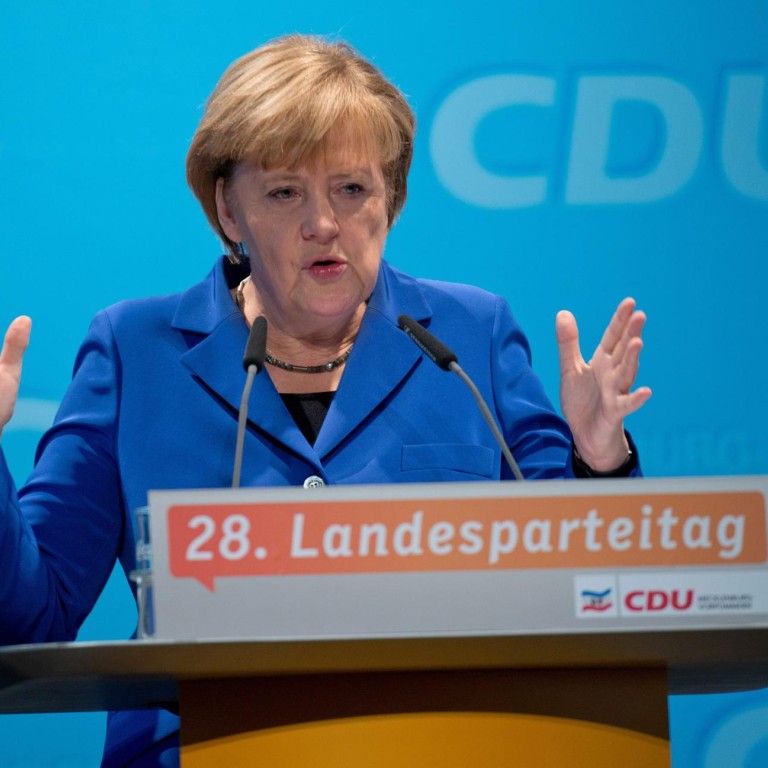
Talk of minimum wage fuels job fears in Germany
Merkel's government is likely to roll out policies that may put the current export boom at risk
Germany has once again become the world's favourite whipping boy, roundly criticised last week by the US Treasury, a top International Monetary Fund official and the European Commission president, among others, for running record trade and current account surpluses that are supposedly detrimental to the European and global economy.
The arguments continue, with the Germans themselves saying the surpluses are simply the happy result of the country's industrial competitiveness and do not hurt anyone else. Lost in the debate, however, is what is happening in Berlin right now. As Chancellor Angela Merkel seeks to form a new coalition government, she appears to be on the verge of throwing out some of the very policies that underpin the export boom of the past decade.
Most controversially, the new government to be formed is likely to introduce a minimum wage, a novelty for Germany and a move that both symbolically and in reality would herald the end of the tough wage restraint that has characterised the past decade. A range of social policy changes, including a possible reduction in the retirement age, are also being discussed, as is higher government spending.
Politicians are acting as though Germany’s continuing prosperity is a given
It is not clear whether such shifts would provide the boost to domestic spending that the US and Germany's other critics are demanding. But their very prospect is sending chills down the spines of German business leaders.
Ulrich Grillo, the president of the Federation of German Industries, warns that "Germany can't afford a grand coalition of election gifts", and says the politicians are acting as though Germany's continuing prosperity is a given, rather than something that needs to be worked at.
Deutsche Bank says flatly in a research report that the proposed minimum wage is "the wrong policy choice".
The shifts in economic policy are coming about as a result of political necessity. Merkel scored strongly in the September 22 parliamentary elections, but her Christian Democratic Union party did not win enough votes to govern alone. The party's top officials have spent the past few weeks locked in negotiations with the opposition Social Democrats over the shape of a coalition government, and they have already given way on a number of points, including the introduction of a minimum wage of €8.50 (HK$90) an hour.
Germany is unusual in that it does not currently have a national minimum wage; pay scales for different industries are traditionally fixed by management and union organisations, in regular rounds of negotiations. Two elements of the planned minimum wage are notable. The first is the level being proposed, which is 45 per cent above the US minimum wage but below France and the Netherlands.
The second notable element is its expected broad application, across the whole of Germany, east and west, and including new entrants to the job market. This amounts to a rollback of the stringent policies put in place by Merkel's predecessor Gerhard Schroeder, starting in 2002, at a time when the German economy was struggling to digest the impact of reunification after the fall of the Berlin Wall.
Schroeder, a Social Democrat, worked together with the former head of human resources at Volkswagen, Peter Hartz, to devise policies that created jobs, in part through the introduction of low-paid "mini jobs" that were exempt from social security charges. These were designed to get hard-to-employ people back into the workforce.
The result has been spectacular: Germany's current unemployment rate, of just over 5 per cent, is half what it was a decade ago and far below the 12.2 per cent average jobless rate in the euro zone. And German productivity gains since then have far outstripped the modest rise in unit labour costs, propelling the current export boom.
Currently, about 12 per cent of workers in western Germany earn below €8.50 an hour, while in the eastern part, the figure is about one in four, according to the IWH institute.
Deutsche Bank is now predicting the planned minimum wage will reverse some of the beneficial effect of the Hartz reforms and will likely increase labour costs generally, because the €8.50 level would be close to the median wage. The bank estimates that between 450,000 and one million jobs will be lost as a result.
Merkel herself has said she will not agree to policies that would jeopardise jobs. Still, whatever the eventual outcome, it is already clear that Germany's economic policy is in for some important changes. The US Treasury and Germany's other detractors should take note.

